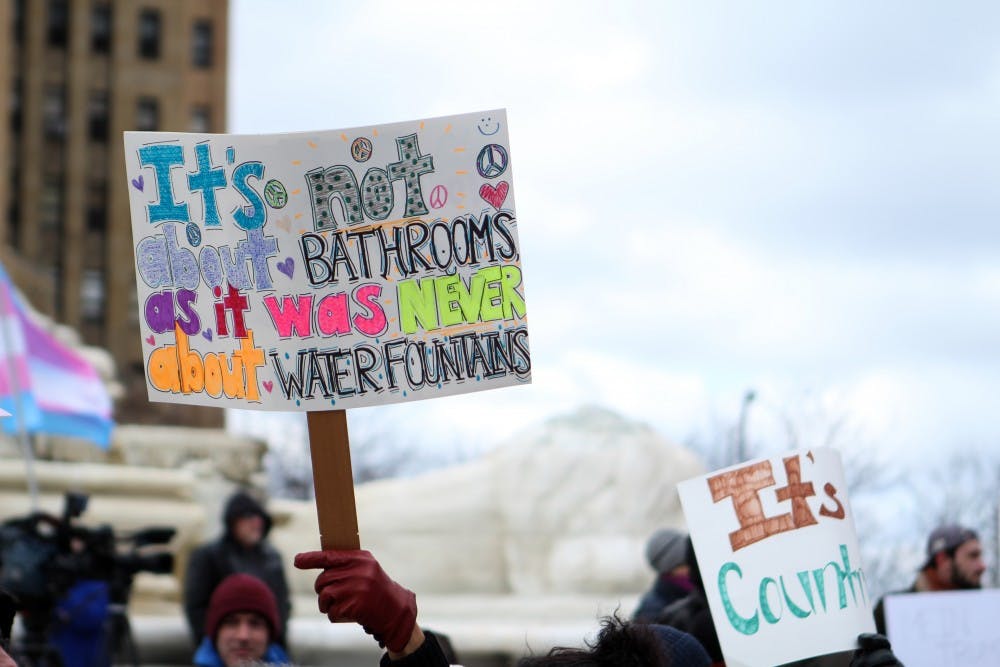Piers Whitaker fears President Donald Trump’s bathroom legislation will criminalize transgender people. He feels the legislation sends a message that transgender people are not allowed to exist in public spaces.
Trump released a memo to public school districts on Feb. 22 that required state law legislators to decide which bathrooms transgender people in public schools could use. The letter revoked President Obama’s bathroom bill, which protected transgender students’ bathroom rights. While conservatives have praised the memo, many liberals oppose it. Transgender UB students feel the legislation threatens the safety and human rights of transgender people.
The legislation may also affect the ruling in transgender teen Gavin Grimm’s ongoing Supreme Court case.
Whitaker, a sophomore biomedical sciences major, is worried about the safety of transgender students in high school.
“I’m mostly worried for trans youth in high school because I came out when I was in high school and there’s already so many things that you face being an out trans person in high school,” Whitaker said. “From locker rooms, to sports teams, to gym class, it seems like everything is there to make you uncomfortable, to fight someone to be able to use the facilities that make you comfortable.”
Stonewall Democrats of Western New York held a protest for transgender civil rights on Sunday in response to the memo. Roughly 200 people participated in the protest.
The bathroom has always been a “place of refuge” for Kaia Grosso, a senior environmental geoscience major.
“If I’m ever getting stressed or anxious in a social situation, it's therapeutic to take a moment to look in the mirror and recollect your thoughts,” they said. “But it was always uncomfortable when other people were in there. After coming out once I left high school, bathrooms have been weird for me.”
Both Grosso and Whitaker always try to use the gender-neutral bathrooms whenever possible.
“It's always a bit irking to see the large ‘men’s’ font on the door walking in knowing I don't identify as such, but sometimes pass as such,” Grosso said.
Whitaker doesn’t use gendered bathrooms if he can avoid it and almost exclusively uses gender-neutral bathrooms.
“I don’t feel as comfortable using men’s bathrooms because I don’t know if I pass to everyone, I don’t wanna have the sort of awkward situation where someone’s like ‘are you in the right bathroom?’ so I just avoid it,” he said.
Whitaker sometimes ends up having to hike across campus to use another bathroom with so few gender-neutral bathrooms on campus.
When Grosso heard about Trump's new bathroom policy, they were “immediately worried.”
“I don't think this is going to be his only step, and I'm sure it will continue down a slippery slope of discrimination against trans and gender nonconforming individuals,” Grosso said. “He's feeding the harmful rhetoric that trans individuals using their identified bathroom will increase the risk of women and children being harassed or attacked.”
Trump’s constituents argued that allowing transgender people to use the bathrooms of their choice would allow sexual predators enter the bathrooms and create dangerous a environment for children.
“I’ve never heard or seen anything of a trans person attacking someone in a bathroom,” Whitaker said. “If anything, it’s the trans person that’s being attacked.”
Grosso also said transgender people are in much more danger of likely being harassed or attacked than the other way around.
Whitaker said he wasn’t surprised when Trump passed the memo. When Trump selected Mike Pence – who advocated for conversion therapy for gay people – as his vice president, Whitaker said he knew the rights of transgender people were in danger.
“I mean since he started running and especially when he announced that Pence was going to be his [vice president], I knew from the start that he wasn’t going to protect anything that [Barack] Obama had done or anyone else had done for the LGBT community or the trans community,” he said.
Whitaker said he was “really lucky” to attend Lehman Alternative Community School, a small alternative school in Ithaca, NY with “an amazing group of staff people” supporting him.
Whitaker and his classmates made one of their multi-stall bathrooms gender neutral in high school.
Lehman Alternative Community School is a democratically-run 6-12 school that focuses on critical thinking skills and problem solving, Whitaker said. Students run the school with the staff and are able to bring up issues and make changes.
“Having that sort of culture at my high school is what gave me the sort of platform to come out and have the opportunity to make a gender neutral bathroom at my school,” Whitaker said. “I was really, really fortunate in that aspect to be living in a progressive place like Ithaca and to be going to the school that I did. I didn’t have many problems at all.”
The uproar against the bathroom memo isn’t just about the bathrooms for many transgender rights activists.
“There is a comparison going around saying ‘it isn't about the bathrooms just like it was never about the water fountains,’” Grosso said. “Obviously the struggle of trans and queer individuals shouldn't be compared to segregation and the issues of people of color, but it's an interesting comparison in the sense it that it draws out the tactic of using laws such as these to essentially deny a right to exist in a public space.”
Grosso said saying a transgender person can’t use the bathroom of their choice is like saying they are not legitimate in the public or government’s eyes.
“It's denying their existence in a sense, not literally of course. And where does the line stop? Surely there will be more policies besides just bathrooms that will affect the trans community. It's a frightening step with a frightening rhetoric which is just putting more marginalized people in danger,” Grosso said.
Ashley Inkumsah is the co-senior news editor and can be reached at ashley.inkumsah@ubspectrum.com





